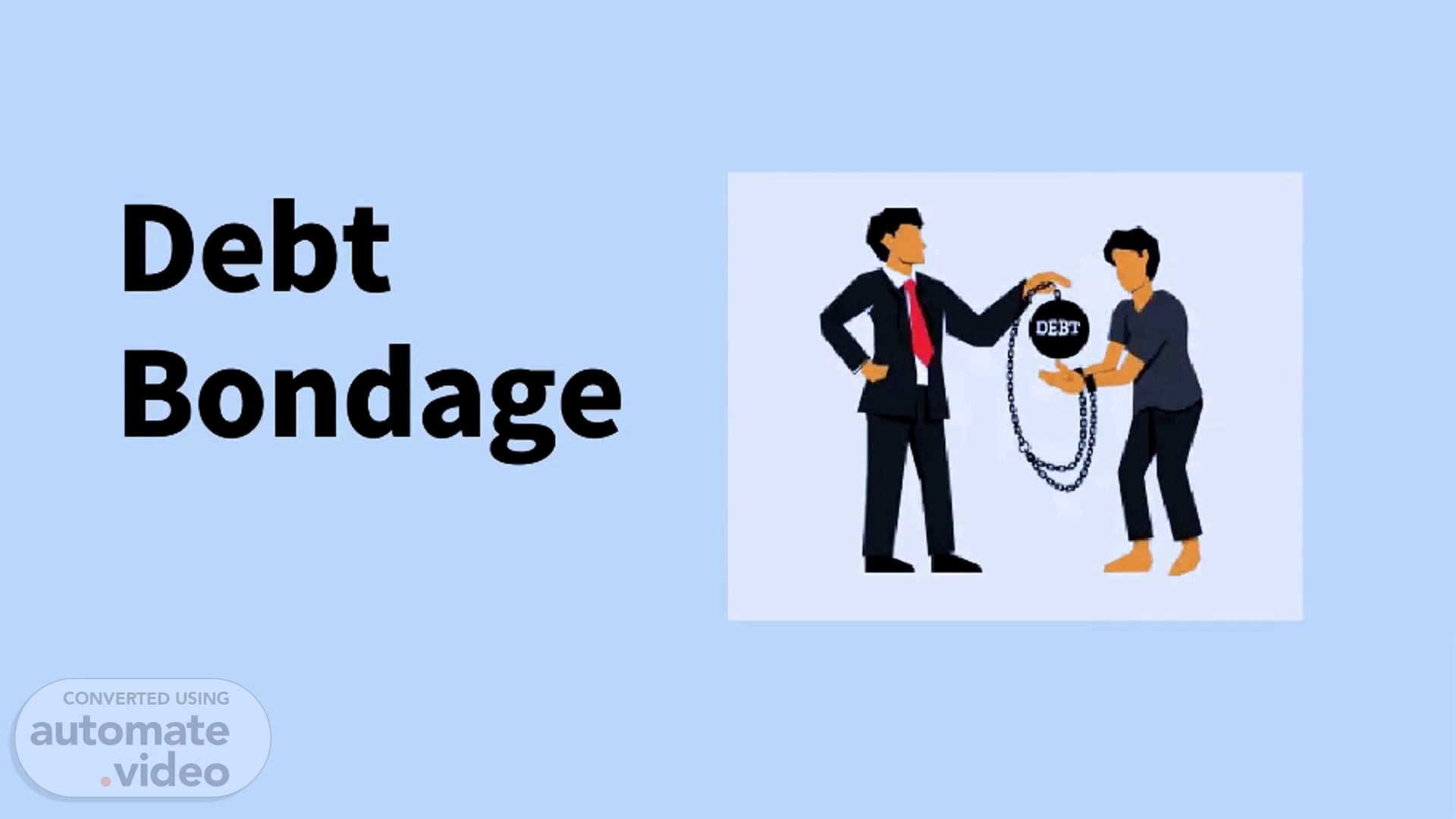Scene 1 (0s)
Debt Bondage.
Scene 2 (28s)
[Audio] Debt bondage is a complex issue that involves multiple factors, including poverty, inequality, and exploitation. Individuals who are forced to work under conditions of exploitation to pay off a debt are victims of debt bondage. These victims often come from poor and marginalized communities, including women, children, indigenous peoples, and caste-affected communities..
Scene 3 (56s)
[Audio] Economic exploitation and poverty are two major consequences that women in debt bondage face. Due to receiving little to no pay, they are trapped in extreme poverty. Many women inherit debt or take loans under deceptive terms, making it difficult to repay due to exploitative wages and high interest rates. This financial dependence prevents them from improving their lives, supporting their families, or achieving economic mobility. Moreover, debt bondage also exposes women to gender-based violence and abuse. Employers and recruiters often use violence and threats to enforce control over these women, creating fear and coercion. Social stigmas, lack of legal awareness, and fear of retaliation prevent many women from seeking protection. In addition, there are serious health and well-being risks associated with debt bondage. Women are often denied access to healthcare, causing malnutrition, exhaustion, and exposure to hazardous conditions. They also face untreated illnesses and long-term health issues. The psychological trauma from forced labor and abuse further deteriorates their mental well-being, reinforcing their oppression. Furthermore, debt bondage restricts women's access.
Scene 4 (2m 12s)
[Audio] The issue of debt bondage is best explained by postmodern or anti-essentialist feminism because it challenges the idea that gender is the sole or primary factor in women's oppression. Instead, this theoretical approach recognizes that multiple intersecting factors—such as class, race, age, education, migration status, and historical inequalities—shape the experiences of women trapped in debt bondage..
Scene 5 (2m 43s)
[Audio] The rights of women violated in debt bondage include the right to health, freedom, and work under fair and safe conditions. Women are working in unsafe environments with little to no compensation, experiencing physical and sexual violence from their employers or traffickers as a means of control. They are trapped in debt bondage and face health risks from grueling labor, lack of healthcare access, and poor working conditions. They are often forced to work long hours under extremely poor conditions to repay debts, with no possibility of escape or independence..
Scene 6 (3m 20s)
[Audio] The Universal Declaration of Human Rights recognizes the rights of women to be free from exploitation and discrimination. The International Labour Organization conventions prohibit forced labor, child labor, and other forms of exploitation. The Convention on the Elimination of All Forms of Discrimination Against Women prohibits discrimination against women in all areas, including employment, education, and healthcare. These laws and conventions provide a framework for protecting the rights of women and preventing debt bondage..
Scene 7 (3m 52s)
[Audio] The issue of debt bondage can be addressed through a range of legal actions. The government provides assistance through the Department of Social Welfare and Development (DSWD), which includes protection and support for those affected. NGOs also offer legal and restorative support. Law enforcement agencies such as the Philippine National Police (PNP) and the National Bureau of Investigation (NBI) carry out operations to rescue victims and prosecute traffickers. In addition, the Department of Labor and Employment (DOLE) and the Commission on Human Rights (CHR) investigate cases and ensure that those responsible are held accountable. Republic Act 9208 makes debt bondage a criminal offense, while the Labor Code guarantees fair wages for workers. The Barangay Justice System also plays a role in resolving cases and providing justice for victims..
Scene 8 (4m 46s)
[Audio] The Philippines has taken steps to address the issue of debt bondage through legal measures. The Labor Code of the Philippines ensures fair wages for workers, while the Anti-Trafficking in Persons Act of 2003 (Republic Act No. 9208) criminalizes debt bondage. The Philippine National Police - Women and Children Protection Center conducts rescue operations against trafficking, and the Department of Social Welfare and Development provides services for trafficking victims. Non-governmental organizations also offer legal and recovery support to victims. The Barangay Justice System settles cases related to debt bondage. These efforts aim to prevent and combat forced labor, including debt bondage..
